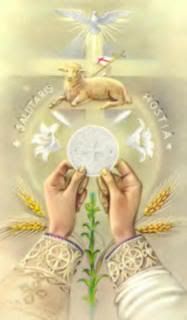St Leonard reminds us that only eight people were saved in the Great Deluge of Noah's day and the rest of the world died. He goes on to say that "The ark was the figure of the Church, and these eight people who were saved signify that very few Christians are saved, because there are very few who sincerely renounce the world, and those who renounce it only in words do not belong to the mystery represented by that ark." The Bible also tells us that only two Hebrews out of two million entered the Promised Land after going out of Egypt, and that only four escaped the fire of Sodom and the other burning cities that perished with it. All of this, St Leonard says, means that the number of the damned who will be cast into fire like straw is far greater than that of the saved, whom the heavenly Father will one day gather into His barns like precious wheat.
He then relates a story told by Saint Vincent Ferrer about an archdeacon in Lyons who gave up his charge and retreated into a desert place to do penance, and happened to die the same day and hour as Saint Bernard. After his death, he appeared to his bishop and said to him, "Know, Monsignor, that at the very hour I passed away, thirty-three thousand people also died. Out of this number, Bernard and myself went up to heaven without delay, three went to purgatory, and all the others fell into Hell."
St. Leonard says there are two roads that lead to heaven - innocence and repentance. He notes that penance is so difficult for people and so poorly performed that it is easier to find men who have kept their innocence than to find any who have done fitting penance.
He closes his sermon with a note of hope - God desires all men to be saved.
God is so good that when He sees a sinner running to his ruin, He runs after him, calls him, entreats and accompanies him even to the gates of hell; what will He not do to convert him? He sends him good inspirations and holy thoughts, and if he does not profit from them, He becomes angry and indignant, He pursues him. Will He strike him? No. He beats at the air and forgives him. But the sinner is not converted yet. God sends him a mortal illness. It is certainly all over for him. No, brothers, God heals him; the sinner becomes obstinate in evil, and God in His mercy looks for another way; He gives him another year, and when that year is over, He grants him yet another. But if the sinner still wants to cast himself into hell in spite of all that, what does God do? Does He abandon him? No. He takes him by the hand; and while he has one foot in hell and the other outside, He still preaches to him, He implored him not to abuse His graces. Now I ask you, if that man is damned, is it not true that he is damned against the Will of God and because he wants to be damned?Powerful stuff.













2 comments:
yikes. its something i have been pondering of late. the scary thing is can one ever make reparation enough for past sins.
Just the excerpts are extremely sobering by themselves, to say the least!
In Preparation for Death, St. Alphonsus Ligouri argues (citing Scripture) that each individual has only a set number of mortal sins that God will forgive, and after that, He will just move in and take vengeance. He also cites private revelations in which certain children are said to have gone to hell after committing their first sin.
I don't know whether any of this is literally true or not; but it is certain that since we never know when we're going to die, it is the height of folly to take a chance of being caught dead in a state of mortal sin. And that, of course, is St. Alphonsus' whole point.
Post a Comment